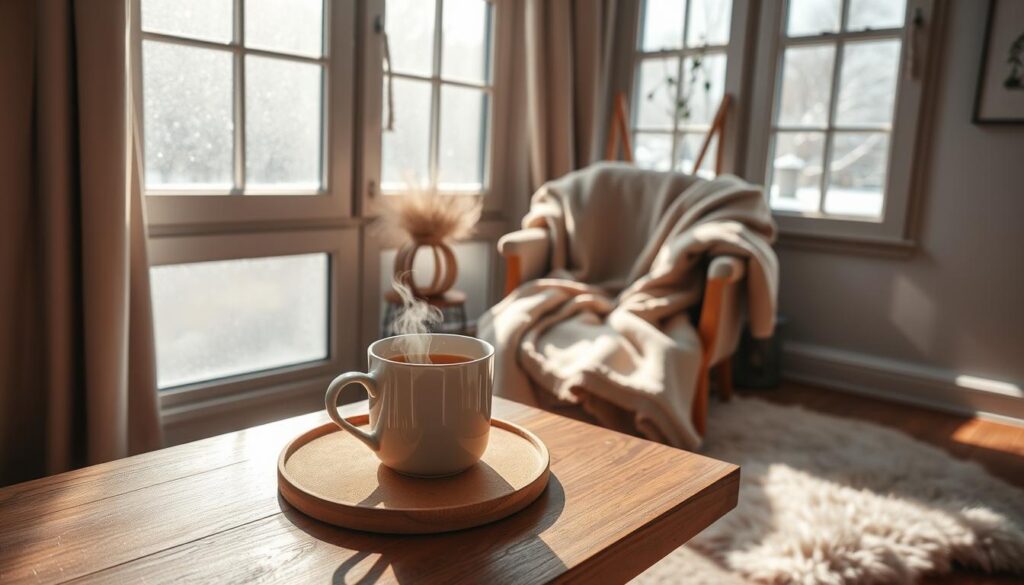Beat the Winter Blues
When it gets colder and the days are shorter, many of us feel down. The winter months can be tough, leading to the “winter blues.” But, with the right self-care, you can fight these blues and stay well all winter.
This guide will help you understand why you might feel down in winter. We’ll also show you how to spot winter depression. Plus, we’ll share self-care tips to help you stay happy and healthy during the cold season. By focusing on your health, you’ll feel refreshed and ready for the new year.

Key Takeaways
- Understand the impact of seasonal changes on your mental health
- Recognize the symptoms of winter depression and learn how to address them
- Discover self-care strategies to boost your mood, energy, and overall well-being
- Create a cozy and comforting winter sanctuary at home
- Incorporate nourishing winter comfort foods into your diet
Some blog articles may contain affiliate links to products or services for which we may receive a commission on transactions. Some of the content on this blog site may be assisted by A.I. generators.
Thank you for visiting our blog!
Understanding Seasonal Blues and Their Impact on Mental Health
As the days get shorter and colder, many people struggle with the “seasonal blues.” This is also known as Seasonal Affective Disorder (SAD). It can really affect our mood and how we feel about life.
Recognizing Winter Depression Symptoms
Understanding the signs of winter depression is key to starting your seasonal self-care journey. Look out for fatigue, losing interest in things you used to enjoy, changes in how much you eat, trouble focusing, and feeling sad or hopeless all the time. Spotting these winter sadness signs is the first step to feeling better.
The Science Behind Seasonal Mood Changes
The main reason for the seasonal blues is less sunlight in winter. This drop in sunlight messes with our body’s natural clock and can upset the balance of serotonin and melatonin. These hormones are important for our mood and sleep.
How Winter Affects Your Body and Mind
Winter can have big effects on our body and mind. Less sunlight can cause vitamin D deficiency, which is linked to depression. Cold weather and not being outside as much can also make us feel lonely and trapped, making the blues worse.
The winter months can be a challenging time for many, but understanding the underlying causes and taking proactive steps can help you navigate the seasonal blues with greater ease.
Winter Wellness Self-Care Tips for Emotional Balance
When winter arrives, it’s key to focus on your emotional health. Simple winter self-care ideas can help you stay positive in winter. They keep you balanced and happy, even when it’s cold.
Start a daily journaling habit. Spend a few minutes each day writing about your thoughts and feelings. It’s a great way to release emotions and understand yourself better.
Positive affirmations are also helpful. Say things like “I am strong and can handle anything” to boost your mood. It helps you feel better about yourself.
Practicing gratitude is another good idea. Make a list of things you’re thankful for, like a warm drink or a cozy blanket. It changes your view and makes you happier.
Don’t forget to manage stress. Try deep breathing, meditation, or yoga to find peace in the winter chaos.
By using these winter self-care ideas, you can stay emotionally strong. This way, you can stay positive in winter and feel better.

Remember, your emotional health is as important as your physical health. Use these winter self-care ideas to take care of your mind and heart. Enjoy a fulfilling winter season.
Creating a Cozy Winter Self-Care Sanctuary at Home
As winter comes, it’s a great time to make your home a cozy self-care spot. Cozy self-care and warm and cozy wellness help create a space that cares for your mind, body, and soul.
Setting Up a Comfort Corner
Start by picking a comfort corner in your home. It could be a cozy nook, a window seat, or a special area for relaxation. Add winter self-care essentials like soft blankets, pillows, and cozy lighting to make it welcoming.
Essential Elements for Winter Relaxation
- Warm, natural lighting from lamps or candles
- Comfy textiles like chunky knit throws and velvet pillows
- Soothing scents from essential oil diffusers or scented candles
- A hot beverage like herbal tea or hot chocolate
- Calming music or nature sounds playing softly in the background
Organizing Your Space for Maximum Comfort
To make your space truly cozy self-care, declutter and organize. Remove things you don’t need and make sure your winter self-care essentials are easy to find. Use items like ottomans, baskets, or shelves to keep things neat and inviting.
| Cozy Essentials | Benefits |
|---|---|
| Soft, Plush Blankets | Provide warmth, comfort, and a sense of coziness |
| Candles or Lamps | Create a warm, soothing ambiance and enhance relaxation |
| Aromatherapy Diffusers | Promote calm and well-being through the power of essential oils |
| Comfortable Seating | Encourage you to unwind and enjoy your cozy space |

With these elements, you can turn your home into a winter self-care sanctuary. It’s a place to relax, recharge, and enjoy the cozy feelings of the season.
Nourishing Your Body with Winter Comfort Foods
When it gets colder and the days are shorter, it’s key to eat nourishing foods. These foods help keep your immune system strong, your mood stable, and give you the energy to stay active. A healthy diet is vital for feeling your best in winter.
Adding meals rich in nutrients to your winter routine is a great idea. Think about hearty soups, stews, and creamy casseroles. These dishes not only taste great but also pack a punch of vitamins, minerals, and antioxidants. They help you stay healthy and feel good.
Warming, Nourishing Meal Ideas
- Roasted butternut squash and lentil soup
- Slow-cooked beef and vegetable stew
- Baked mac and cheese with a side of roasted Brussels sprouts
- Quinoa and sweet potato chili
- Creamy mushroom and wild rice casserole
It’s also important to drink plenty of water in winter. The dry air can dry out your body quickly. Drink water all day and enjoy warm drinks like herbal tea or hot chocolate. They make you feel cozy and happy.
“Nourishing your body with winter comfort foods is not just about satisfying your taste buds – it’s about supporting your overall health and well-being during the colder months.”
By choosing wholesome, seasonal foods and enjoying winter’s comforting flavors, you can take care of your body and mind. This helps you feel good and stay strong all season long.

Light Therapy and Natural Light Exposure Strategies
When winter comes, many feel sad and tired. But, there are ways to fight the winter blues and stay mentally healthy. Using light therapy and getting more natural light are two effective methods.
Benefits of Light Therapy Lamps
Light therapy lamps, or SAD lamps, mimic natural sunlight. They emit bright light that helps your body’s clock and boosts serotonin. This can combat winter sadness, boost mood in winter, and enhance winter mental health.
Maximizing Natural Daylight Hours
It’s also key to make the most of natural daylight in winter. Spend time outside, even for a quick walk, to get some sunlight. If outside time is hard, place your work or living area near windows to get more natural light.
Creating a Light-Friendly Environment
- Invest in bright, full-spectrum light bulbs for your indoor lighting to mimic the effects of natural sunlight.
- Use light-colored or reflective surfaces in your home to help amplify the available light.
- Incorporate mirrors strategically to bounce light around and create a brighter, more inviting atmosphere.
By using light therapy, enjoying natural daylight, and making your space light-friendly, you can combat winter sadness, boost mood in winter, and improve your overall mental health during the colder months.

Movement and Exercise to Combat Winter Lethargy
Winter can make us feel slow and unmotivated. But, regular exercise can fight off the winter blues. Winter wellness means staying active and full of energy, even when it’s cold.
Indoor workouts are great for beating the blues. Try yoga, Pilates, or HIIT workouts at home. They keep you fit and happy, without having to go outside.
For a change of pace, try outdoor winter sports. Stay positive in winter by skiing, snowshoeing, or ice skating. These activities are fun, get your heart racing, and let you enjoy the winter views.
Find exercises you love to stay motivated in winter. Try different activities and keep things interesting. A mix of indoor and outdoor activities will help you stay lively all season.
| Indoor Exercise Ideas | Outdoor Winter Sports |
|---|---|
| Yoga Pilates HIIT workouts Strength training Cardio exercises | Skiing Snowshoeing Ice skating Cross-country skiing Sledding |

“Physical activity is not only good for your body, but it also has a profound impact on your mental health. Embrace the winter season as an opportunity to stay active and boost your overall well-being.”
Mindfulness and Meditation Practices for Winter Months
Winter is a great time to try mindfulness and meditation. These activities can bring you peace and balance when it’s cold and dark. Adding simple mindful habits to your day can help you feel better and take care of yourself during winter.
Simple Daily Meditation Techniques
Meditation is easy and doesn’t take much time. Begin with just a few minutes each day to calm your mind and focus on your breath. Use a guided meditation app or sit quietly, watching your thoughts without judging. Try to meditate every day, even if it’s just for a short time.
Mindful Winter Activities
- Take a mindful snow walk, noticing the sound of the snow and the fresh air.
- Try mindful activities like ice skating or cross-country skiing to be fully present.
- Explore nature, seeing how it changes with the seasons.
Breathing Exercises for Stress Relief
When winter feels too much, use simple breathing exercises to relax. Try box breathing: inhale for four counts, hold for four, exhale for four, and hold for four. Do this a few times to reduce stress and anxiety.

By adding mindful winter habits, winter mental health tips, and seasonal self-care to your routine, you can find peace and balance in winter. Start small and make mindfulness a regular part of your life.
Social Connection Strategies During Cold Weather
When winter arrives, it’s key to focus on staying connected. Feeling isolated is common, but strong bonds can fight off the winter self-care ideas. Here are ways to keep your social circle strong during the cold months.
Virtual Gatherings and Shared Experiences
With remote work and social distancing, virtual meetups are a great way to stay in touch. Set up regular video calls with loved ones. You can also host virtual game nights, movie nights, or cooking classes. These comforting winter activities bring people together, even when they’re apart.
Safe In-Person Meetups
If you’re okay with seeing people in person, plan small gatherings. Choose activities like walks, dinners, or indoor games. Always follow health rules and make sure everyone feels safe and comfortable.
Nurturing Long-Distance Relationships
For those far away, think outside the box to stay connected. Send care packages, write letters, or schedule calls. These efforts keep the emotional ties strong, even when we’re apart.
Being proactive about staying connected can beat the winter blues. Let the love and support of your friends and family warm your heart. Their presence can be a beacon of joy and strength during the cold months.

Building a Winter Wellness Morning Routine
As winter comes, keeping a morning routine is key for your health. Adding simple yet powerful rituals can make your mornings better. You’ll feel more energized, focused, and positive.
Wake-Up Rituals for Dark Mornings
Winter mornings can be tough to wake up for. But, with a few tricks, you can start your day with joy. Use a light therapy lamp to help your body wake up naturally. Add deep breathing or meditation to feel centered.
Energizing Morning Activities
- Start with a winter-inspired breakfast that’s both tasty and healthy. It will fuel your body and mind.
- Go for a brisk walk outside. It gets your blood flowing and lifts your mood, even on cloudy days.
- Do some gentle stretching or a quick yoga flow. It wakes up your body and lifts your spirit.
Setting Intentions for the Day
End your morning by setting your intentions for the day. You can journal, visualize your goals, or simply breathe deeply. Starting with a clear purpose helps you face winter’s challenges and opportunities.
Your wellness routines for winter should fit your needs. Try different activities to find what works best for you. This will help you stay healthy and happy during the cold months.

Conclusion
As winter comes, remember to take care of yourself. Use the winter wellness self-care tips we shared. This way, you can beat the winter blues and stay healthy all season.
Make your home cozy and eat foods that warm your heart. The tips in this guide can help you feel better. Try light therapy, exercise, and mindfulness to fight off winter tiredness.
Thriving in winter means focusing on self-care and finding happiness in small things. Take time to relax, be with family, and find peace within. Doing this will make you feel new and ready for the year ahead.
FAQ
What are the main symptoms of seasonal depression or the “winter blues”?
Seasonal depression, or SAD, makes you feel sad and tired. You might sleep more or less than usual. You could lose interest in things you used to love and find it hard to focus.
You might also eat more or less, pull back from friends, and get irritable. These are all signs of SAD.
How does reduced sunlight exposure affect mental health in the winter?
Less sunlight in winter messes with your body’s clock and mood. It can make you feel tired and sad. This is because sunlight helps your body make serotonin, a mood booster.
What are some effective strategies for managing stress and anxiety during the winter?
To fight winter stress and anxiety, try mindfulness and meditation. Regular exercise and a steady sleep schedule help too. Adding calming activities like journaling or deep breathing to your day can also help.
Don’t forget to talk to friends or a mental health expert for support.
How can I create a cozy and comfortable self-care sanctuary at home during the winter?
Make your home cozy with warm lights, soft blankets, and calming scents. Organize your space for relaxation. Create a “comfort corner” with your favorite things.
Add a warm drink, soothing music, and nature decor to make it even cozier.
What types of winter comfort foods can boost my mood and support my overall health?
Eat warming foods like soups, stews, and roasted veggies. They nourish your body and lift your mood. Include foods full of vitamins and antioxidants, like citrus fruits and leafy greens.
Stay hydrated and eat well to keep your body and mind healthy.
How can light therapy lamps help combat the winter blues?
Light therapy lamps give off bright light to make up for winter’s lack of sun. Using one for 30 minutes a day can improve your mood and energy. It also helps with sleep.
What are some effective indoor exercises I can do to combat winter lethargy?
Stay active indoors with yoga, Pilates, strength training, or HIIT workouts. You can also join virtual fitness classes or follow workout videos at home.
How can mindfulness and meditation practices benefit me during the winter months?
Mindfulness and meditation reduce stress and improve your mood. They help you feel more present and grateful. Try simple meditation or mindful activities like snow walking.
What are some tips for maintaining social connections during the cold weather?
Keep in touch with friends and family online, like through game nights or video chats. Look for safe, in-person activities too. Regularly reaching out to loved ones helps fight loneliness.
How can I create a energizing and intentional morning routine to start my day off right in the winter?
Start your day with gentle wake-up rituals and energizing activities. Set daily goals to feel positive and ready for winter’s challenges. Try light meditation, journaling, or light exercise to boost your mood.
Some blog articles may contain affiliate links to products or services for which we may receive a commission on transactions. Some of the content on this blog site may be assisted by A.I. generators.
Thank you for visiting our blog!




2 Comments